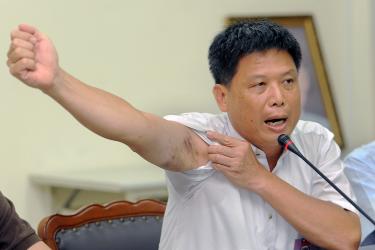A university professor who was arrested on Tuesday during a protest over the forced demolition of houses in Dapu Borough (大埔) in Miaoli County’s Jhunan Township (竹南) accused national security authorities of instructing police to use excessive force against protesters and urged President Ma Ying-jeou’s (馬英九) administration to stop enforcing repressive controls over its people.
“Most of Taipei City’s police officers were nice to me and I believe they were forced by national security authorities to handle the protest with violence. It’s the national security authorities that are uncivilized,” National Chengchi University professor Hsu Shih-jung (徐世榮) said at the Taipei City Council.
Hsu was pulled away by police officers on Tuesday afternoon while shouting the slogan: “[You] knock down houses in Dapu today; [we] tear down the government tomorrow” at Ma’s motorcade as the president arrived at the Ministry of Health and Welfare on Tacheng Street in Taipei.
The police dragged him to a police car and sent him to the Shilin District Prosecutors’ Office, saying that he had violated the Public Safety Act (公共危險罪).
He was released at about 10:30pm because of what police said was a “lack of evidence.”
Showing bruises on his arms, Hsu said he cooperated with the police officers who asked him to leave the restricted area during the protest. However, the police arrested him and pulled him away as he walked out of the area while chanting the slogan.
While he was being dragged away, one police officer questioned the rude and violent acts against him, asking another officer to stop such violent treatment, Hsu said.
“Police officers in Taipei City are quite civilized. I don’t understand why President Ma and national security authorities cannot let the police officers enforce laws with dignity,” he said.
To support Hsu and other protesters’ rights to freedom of speech and assembly, the Democratic Progressive Party (DPP) Taipei City caucus urged the government to adjust its handling of protests and stop creating tension between the police and the public.
DPP Taipei City Councilor Hsu Chia-ching (徐佳青) said the Taipei City Police Department’s Datong branch had received orders to carry out a regular traffic control plan at the health ministry. However, it received an emergency instruction on Tuesday morning to expand restricted areas. The department’s Zhongcheng First branch also sent police officers to the site after the national security authorities decided to enhance security measures.
“The Ma administration has turned the nation into a police state, with Ma sending national security personnel to arrest whoever protests against him,” she said.
Undaunted, a group of students held a protest across the street from the Chinese Nationalist Party (KMT) headquarters yesterday afternoon.
Carrying placards that read: “Treacherous government forcefully demolished houses in Dapu,” the protesters shouted at Ma’s motorcade as he arrived at the KMT headquarters to preside over the party’s Central Standing Committee.
Police officers set up fences in front of the buildings to keep protesters from getting close to the party headquarters, and pulled a young woman away as she tried to enter the building.
A protester who wore a mask accused the police of violating the public’s rights to use the roads by blocking traffic around Bade Road, and questioned the legitimacy of such excessive policing.
“There are more than 100 police officers here today to handle such a small group of people. In a democratic society, the government should be afraid of its people, not the other way around,” he said.
Ma later left the party headquarters without commenting on the protest.
Commenting on the clashes and arrests on Tuesday, the DPP said the government’s behavior has reached the level of state violence and has reminded Taiwanese of the KMT’s authoritarian past.
In addition to Hsu, National Taiwan University students Hung Chung-yen (洪崇晏) and Lu Chih-hung (盧其宏) were arrested by police.
“I cannot describe how angry the DPP is with an administration that has betrayed its own pledge, demolishing houses in Miaoli when the villagers were protesting in Taipei and deploying police to arrest whoever shouts slogans along the president’s way,” DPP Chairman Su Tseng-chang (蘇貞昌) said.
“It does not take surveys from international institutions to tell us that democracy in Taiwan has been backsliding. We can tell from what we saw that the ghost of the KMT’s authoritarian and dictatorial past is back,” he added.
DPP spokesperson Lin Chun-hsien (林俊憲) said National Security Bureau Director Tsai Der-sheng (蔡得勝) should be held responsible for stepping beyond his authority by ordering violent measures against civilian protesters, which Lin said was illegal and unconstitutional.
The DPP also announced it was organizing a group of volunteer lawyers to provide legal assistance to villagers in Dapu, as well as those who suffered from the government’s injustice.
Meanwhile, the DPP caucus yesterday demanded that the Taipei City Police Department submit the roster of police officers on duty on Tuesday within a week and said it would file lawsuits against law enforcement officials.
Speaking at a press conference, DPP Legislator Wu Ping-jui (吳秉叡), a former judge, said prosecutors’ release of all detainees without bail showed that the police had abused their power and made arrests without sufficient evidence.
Former premier Yu Shyi-kun, who formerly served as Yilan County commissioner, said that while the government always loved to say it “administers by law,” it should not administer by state violence.
Source: Taipei Times - 2013/07/25





















